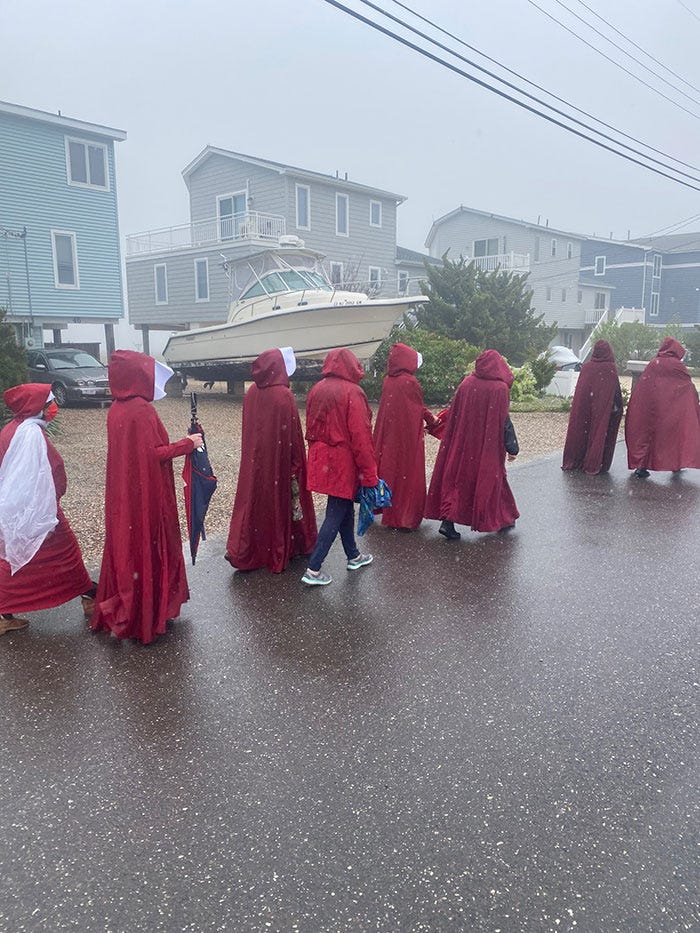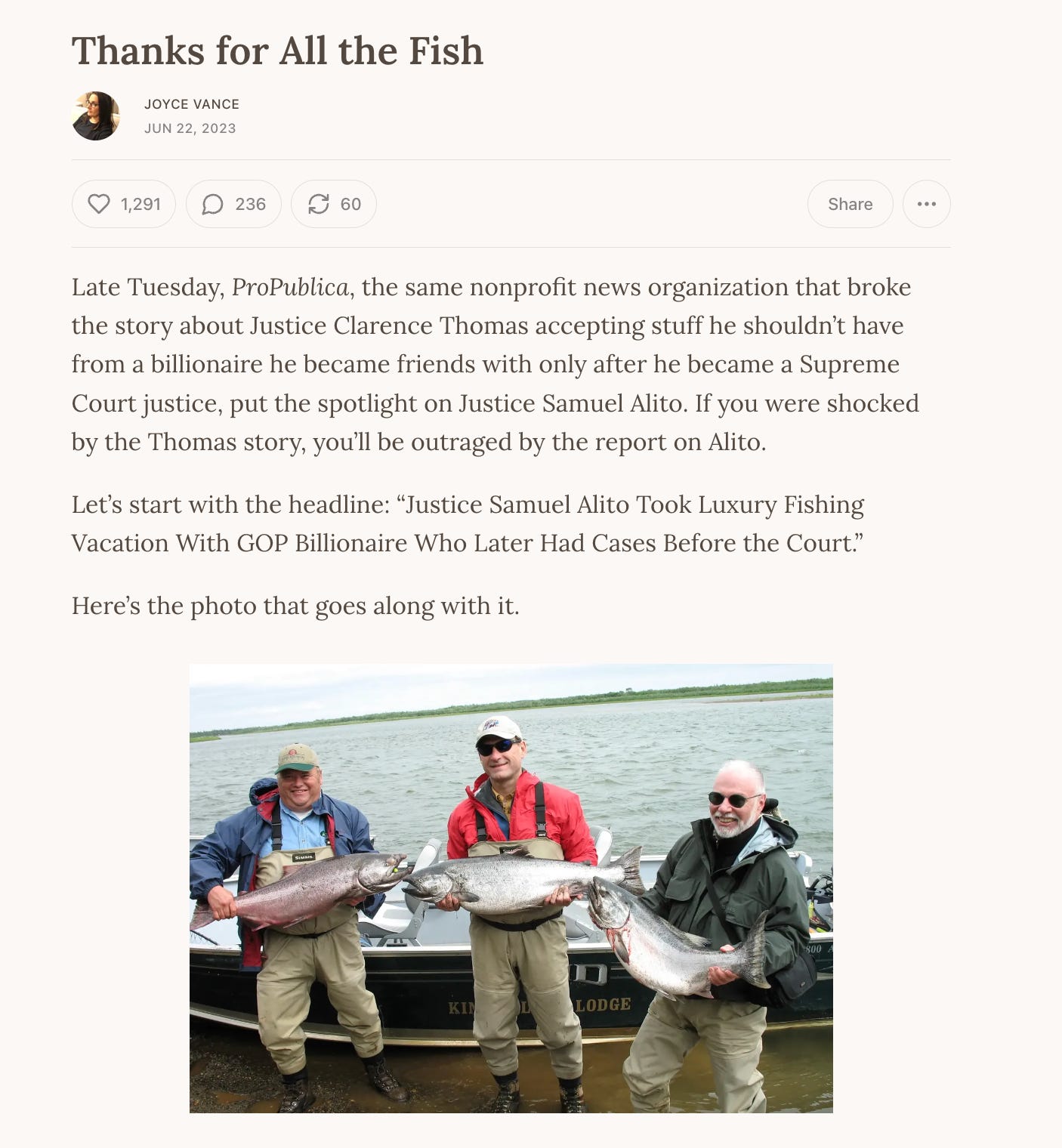My God.
Tonight, more reporting from Jodi Kantor, joined by Aric Toler and Judy Tate at The New York Times, on Justice Alito’s flag-flying practices. It turns out that in the summer of 2023, the Alitos flew an "Appeal to Heaven" flag at their summer beach house in New Jersey. The Times reports that “Three photographs … along with accounts from a half-dozen neighbors and passers-by, show that the Appeal to Heaven flag was aloft at the Alito home on Long Beach Island in July and September of 2023. A Google Street View image from late August also shows the flag.”
That’s two and a half years after January 2021, the month when Mrs. Alito had her run-in with a neighbor. Prosecutors might describe this trend as ongoing evidence of motive and intent. It’s outrageous behavior for a judge.
The Appeal to Heaven flag the Alitos flew is "now a symbol of support for former President Donald J. Trump, for a religious strand of the ‘Stop the Steal’ campaign and for a push to remake American government in Christian terms." Get yours on sale at patriotdepot.com where it's available for the low price of $14.95. You can read the “Reviews from Happy Patriots!”
It's perfect for carrying to your next insurrection, just like rioters did on January 6, 2021.
According to the American Flags website, the flag was originally commissioned by George Washington's secretary as a symbol of American resistance to the British. Also called the Pine Tree Flag, “the Appeal to Heaven flag represents the growing anger of the colonists prior to the American Revolution. No longer were they willing to surrender their freedom to an oppressive English monarch. Instead, they relied on God's power for justice.” That site notes the evolution of the flag’s significance today, “Popular among Republicans and Christians, it is seen as a symbol of Christian nationalism, often flying on the National Day of Prayer.” Tonight’s New York Times piece quotes Matthew Taylor, a religion scholar at the Institute of Islamic, Christian, and Jewish Studies, noting that until about a decade ago, the Appeal to Heaven flag was “mostly a historical relic,” but it has been adopted more recently as “a theological vision of what the United States should be and how it should be governed.”
Dahlia Lithwick, in an excellent piece tonight that you should read, writes, “That flag is not merely another January 6 signifier but also rooted in John Locke’s ‘appeal to heaven,’ meaning ‘a responsibility to rebel, even use violence, to overthrow unjust rule.’” And yet, Justice Alito will, absent some unforeseen development of spine by the Chief Justice, be permitted to participate in deciding the two big cases related to Jan. 6 on the Court’s docket this term, one involving whether the Electoral College is an official proceeding that can be obstructed under a statute frequently charged in rioter cases and by the Special Counsel against Donald Trump, and the other, Trump’s claim of presidential immunity from prosecution. There is no shame on the Court.
Perhaps we will learn some feud with local aquatic life led Mrs. Alito to fly the flag. But sarcasm aside, when you're a Supreme Court Justice, you're supposed to avoid giving off even a whiff of partisan bias. Or religious favoritism. As a judge, and certainly, as a Supreme Court Justice, you have that duty. Justice Alito flunks the test and flunks it badly.
In June 2023, ProPublica reported on Alito’s expensive vacation trip with conservative influencers, who had an interest in the outcome of cases before the Court and, later, had a case before it. We discussed that situation here, and it’s worth reviewing in light of this most recent news about Alito. The flight on that trip was valued at more than $100,000, and Alito didn’t know the man who gifted it to him, but figured it was okay, because the seat would have been empty on the flight if he hadn’t filled it. Lawyers should try this argument before the Court on behalf of their clients, “Your honor, if I hadn’t stolen that jewelry from the victim, it would have just sat in her jewelry box, unworn.”
Alito has a history of making speeches that confirm his Christian nationalist leanings and stray into political territory, like his November 2020 keynote address to the Federalist Society. In that speech and others, he has made it clear that his religious liberty is more important than the rights of others, including gay people who he joked (?) weren’t harmed when they couldn’t get a wedding cake from a local business because celebrity chefs stepped in. “Religious liberty is fast becoming a disfavored right,” Alito lamented to the Federalist Society. For Justice Alito, it’s First Amendment rights for me, but not for thee. And it all adds up.
Alito wrote Dobbs. What will he write next? Will it be the opinion that takes away access to contraception? Will he be part of a majority that affirms the Louisiana law making it a crime to possess birth control that we discussed last night? Will Alito one day approve of it when Alabama or some other state’s attorney general goes after women or trans people who go out of state to obtain medical care? Can we have any confidence that Justice Alito is making decisions based on the law, not on his personal politics and religious beliefs? By his own conduct, he has made that impossible and undercut his ability to serve on the Court without damaging, perhaps inflicting a fatal blow at this point, to public confidence in it.
Justice Alito is only one of the nine, but he is influential, and he has done it by engaging in jingoistic legal analysis that rejects stare decisis—binding prior case law—and principle in favor of false appeals to history and tradition. Justice Alito’s dissent when the Supreme Court stayed Amarillo, Texas, Judge Matthew Kacksmaryk’s order that would have ended all access to mifepristone while the litigation proceeded was an example. I wrote at the time, “Justice Alito’s arguments have a tinge of sour grapes, not legal principle.” When he wrote the majority opinion in Dobbs (the one we saw in leaked form before it became official), he relied on a 17th-century English jurist, Sir Matthew Hale, to support his position that there was no historical legal right to abortion. Hale is responsible for the common law rule that said husbands couldn’t be prosecuted for raping their wives. He also sentenced women to death as “witches.” Alito is steeped in the history and tradition of misogyny.
What’s to be done? It is clear that the Court will not reform itself. Neither Justice Alito nor Justice Thomas will voluntarily recuse from cases where they have clear conflicts of interest, and Chief Justice Roberts either cannot or will not force them to. Investigation into improper conservative influence over the Republican appointees seems to have fizzled. In other words, the cavalry is not coming. This one, as I’ve written, is up to us, and to investing in the political cycle. Don’t despair, vote!
For decades, Republicans have rallied their voters around the idea that the Court and the courts are a key reason voters should support the Republican presidential nominee, no matter who it is. There was a lot of that around Trump in 2016, despite the debacle of the Access Hollywood tape and his spate of racist and misogynistic comments. Republicans succeeded in making the Court a, if not “the,” political issue, and they are now reaping the benefits of that approach.
If you want a Congress that will pass ethics reform for the Supreme Court, as difficult of an endeavor as it may be to craft rules that will pass constitutional muster, then vote for people who will go on record as supporting it. It’s okay to ask before you vote! Today, President Biden saw his 200th judicial appointee confirmed to office. He has put qualified people on the bench; a cohort that reflects the richness and diversity of the American legal community. Rhode Island Senator Sheldon White House has a Supreme Court ethics bill in the Senate, and we should support it and insist that our representatives support it. But, and this is the important part, we also have to view this issue as a long-term political one that should drive our votes in November
By contrast, President Obama, facing steep opposition to his nominees from Republican Senators, was only able to confirm 334 judges during his eight years in office. Democrats did not have a Senate majority during Obama’s second term, so they had to rely on their ability to pick up a few Republican votes to confirm, with predictable results, including the open Supreme Court seat that let Trump appoint Neil Gorsuch, followed by two more Justices—because he had control of the Senate. The lesson is obvious. If you care about the courts, vote. We are not powerless, even if we cannot act immediately and in the moment.
But there is more we can do. Tonight in the New Jersey neighborhood where Alito’s beach house is located, a group, mostly women, gathered in pouring rain to protest. The protest was peaceful and largely silent.
It takes a lot of love for democracy and horror at what we are observing to go out in the rain like that. It’s going to take a lot to fix what’s wrong at the Court. Women have often led the way in this country. It was women who sparked the first protests against Trump after his inauguration, the Women’s March on January 21, 2017, and built the awareness that blocked some of the worst abuses and jump-started the coalitions that led to his defeat in 2020.

We cannot let Justice Alito get away with it. While we cannot force Alito and Justice Clarence Thomas to recuse or Chief Justice John Roberts to find the moral compass to lead this iteration of the Court that bears his name, we can make sure they don’t get a pass. We can march, and we can vote.
Justice Alito has just helped us understand the central role of the courts and particularly of the Supreme Court in the 2024 election. Thank you, your honor.
Here at Civil Discourse, our job is to keep the Republic. Thank you for being here with me. Thank you for subscribing, and especially to those of you who have paid subscriptions, which make it possible for me to devote the time and resources it takes to research and write the newsletter.
We’re in this together,
Joyce









Thank you Joyce. We cannot give up, no matter how high the hurdles seem. I believe women will lift Biden to victory, and hopefully, give Dems the wins they need to win the House and d Senate. Then, we can clean house!!
The following are extracts from the Code of Conduct that binds all federal judges in the U.S. except those on the Supreme Court, which has refused to adopt the Code.
Samuel Alito has crossed the line on the prohibitions below, with emphasis in Canon 5 on his overt endorsement of Donald Trump and his claim that the 2020 election was stolen from him.
Code of Conduct for United States Judges:
An independent and honorable judiciary is indispensable to justice in our society. A judge should maintain and enforce high standards of conduct and should personally observe those standards, so that the integrity and independence of the judiciary may be preserved.
Canon 2A. An appearance of impropriety occurs when reasonable minds, with knowledge of all the relevant circumstances disclosed by a reasonable inquiry, would conclude that the judge’s honesty, integrity, impartiality, temperament, or fitness to serve as a judge is impaired.
C. Disqualification. (1) A judge shall disqualify himself or herself in a proceeding in which the judge’s impartiality might reasonably be questioned, including but not limited to instances in which: (a) the judge has a personal bias or prejudice concerning a party, or personal knowledge of disputed evidentiary facts concerning the proceeding;
Canon 5: A Judge Should Refrain From Political Activity A. General Prohibitions. A judge should not: (1) make speeches for a political organization or candidate, or publicly endorse or oppose a candidate for public office;